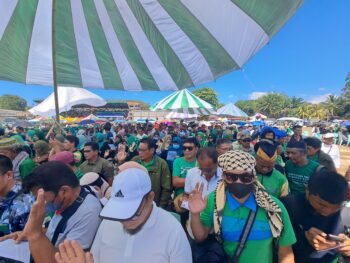GENERAL SANTOS CITY (MindaNews/11 September) — The provincial government of South Cotabato has linked up with non-government environment group Ban Toxics in a bid to eliminate the use of mercury in artisanal and small-scale gold mining operations in T’boli town.
South Cotabato Gov. Daisy Avance-Fuentes said Thursday they signed a memorandum of understanding (MOU) with Ban Toxics for the joint implementation of technical and health trainings as well as massive information and education campaigns regarding the long-term risks and hazards of mercury use in mining operations in the area.
She said the initiative will mainly focus on influencing small-scale miners and operators of ball mill or gold processing plants in T’boli to end the use of mercury and instead adopt safer and toxic-free mining and gold extraction techniques.
“The risk of mercury contamination and poisoning in the province is quite serious because of its rampant use in our mining areas. So it’s about time that we properly address this matter and implement concrete measures to resolve it,” the governor said.
The local government and Ban Toxics formalized their partnership following a meeting at the provincial capitol in Koronadal City late Wednedsay afternoon.
Fuentes signed the MOU on behalf of the provincial government while Ban Toxics was represented by Evelyn Cubelo, the group’s program manager for artisanal and small-scale gold mining.
The MOU signing was witnessed by Dr. Ramus Rasmussen, project leader of Ban Toxics! international partner Dialogos, and Peter Appel, senior research scientist of the Copenhagen, Denmark-based Geological Survey of Denmark and Greenland and the International Center for Occupational, Environment and Public Health.
Fuentes said the initiative will be implemented in small-scale mining areas in T’boli town, specifically in the gold rush villages of Kematu and Desawo.
She said T’boli was chosen as the project’s focal area being the center of small-scale mining operations in the province and the presence of declared people’s small-scale mining areas or “minahang bayan.”
Under the agreement, the governor said Ban Toxics will initially conduct an environmental scanning of T’boli’s small-scale mining areas to determine the extent of mercury use, the general status of mining operations and people involved in related activities.
She said the group’s technical experts will initially educate small-scale miners, ball mill or processing plant operators and local stakeholders regarding the hazards of mercury and later introduce alternative mining and extraction methods.
In a press conference prior to the MOU signing, Cubelo said they will initially meet with leaders of small-scale mining and processing groups in T’boli to solicit their participation and map out the strategies for the program’s implementation.
She said they will then roll out massive information and education campaigns regarding the hazards of mercury in local schools and communities.
Cubelo said they have developed modules and teaching materials on the matter for school children and other target sectors.
“We will later engage directly with the small-scale miners and processors and introduce to them various mercury-free methods of gold extraction,” she said.
She said they will train a core of miners regarding the alternative mining and processing techniques, specifically the Benguet method, and tap them in training other miners later on.
“We’re aiming to reach out to all concerned sectors in the area in the next three years,” Cubelo said.
The Benguet method, which was predominantly used in Benguet province and popularized by BAN Toxics, is an enhanced traditional technique that utilizes gravity and borax in gold extraction.
Borax is a common commercial chemical that is found in laundry boosters, some hand soaps and in toothpastes.
Studies conducted by Ban Toxics showed that borax, when used as a flux for smelting gold out of heavy mineral concentrates, is an effective and safer substitute for mercury.
The Benguet method involves adding borax to milled ore to reduce the melting point of gold to a level accessible to small-scale miners.
Citing their experiences in small-scale mining areas in Benguet and Kalinga Cubelo said miners were able to get the best quality of gold using the Benguet method.
Through the method, she said miners could extract 70 percent of the gold from ore compared to 50 percent with the use of mercury.
“Aside from getting more gold and at better quality, they will be saving a lot if they stop using mercury as it now costs as much as 15,000 a kilo,” she added. (MindaNews)
